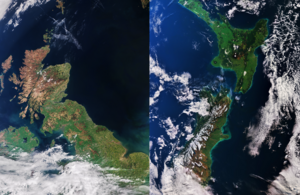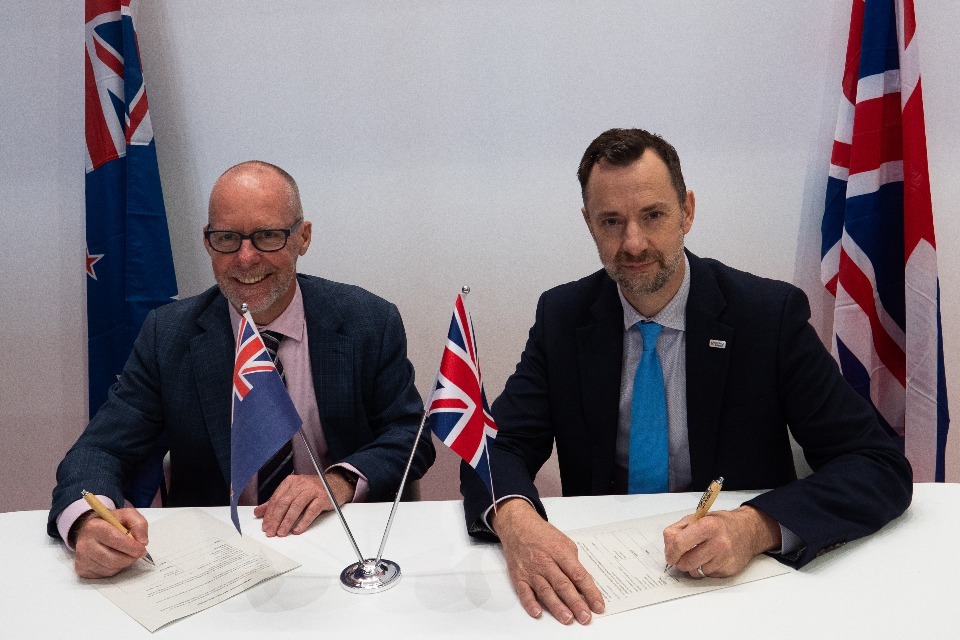UK and New Zealand agree blueprint for satellite removal and servicing missions
The UK and New Zealand space agencies have signed a blueprint for the removal and servicing of operational satellites that are very close together or making contact with one another.

Contains modified Copernicus Sentinel data, processed by ESA
The arrangement, signed at the International Astronautical Congress in Milan, is designed to support missions in the fast-growing areas of in-orbit servicing, space debris removal and satellite refuelling, known as ‘rendezvous and proximity’ operations.
Modern society is increasingly reliant on satellite technology and the Earth’s orbits are more crowded than ever before. There is an urgent need to invest in new technologies that can help remove debris from space and keep satellites operating for longer.
However, these complex missions involve moving spacecraft close to one another, and the novel nature of these missions raises difficult questions around the application of international rules and guidelines, particularly if launched and operated by more than one nation. Given the importance of improving space sustainability, New Zealand and the UK have been exploring ways to reduce the legal, policy, and regulatory barriers, and uncertainty associated with multistate rendezvous and proximity missions.
The work between the UK and New Zealand is designed to demonstrate how international cooperation in this area can keep space sustainable for current and future generations. It provides a set of principles for allocating liability between different states involved in the different stages of these missions. It does this within the framework set out in the Convention on International Liability for Damage Caused by Space Objects (the ‘Liability Convention’), as well as principles around licensing and information sharing.
As the Liability Convention was established in 1972, when most space missions were led by governments rather than companies, the UK and New Zealand are hoping to make its application to the current space age easier to navigate, reducing barriers for industry to carry out these important mission types.

Iain Cossar, Head of the New Zealand Space Agency and Dr Paul Bate, Chief Executive of the UK Space Agency sign the arrangement at IAC 2024 in Milan.
Dr Paul Bate, Chief Executive of the UK Space Agency said:
As space leaders from across the world gather in Milan this week, we’re pleased to agree with our partners in New Zealand a world-first arrangement to help ease the way for future missions that can help keep space sustainable.
In-orbit servicing and manufacturing and space debris removal are high-growth areas for the global space sector, and we hope our work with New Zealand can act as a blueprint for other nations to follow and benefit from.
Iain Cossar, Head of the New Zealand Space Agency said:
We place a lot of importance on space sustainability in New Zealand, and this agreement with the UK demonstrates our commitment to ensuring our space environment is safe and sustainable.
The arrangement outlines how we will cooperate on active debris removal and in-orbit servicing missions.
The principles and guidance we have developed could apply more broadly to other states, and like the UK, we hope this work can serve as a blueprint to enable these important activities internationally as we look to address the challenges posed by orbital debris.
New Zealand is home to the world’s first private spaceport which has conducted 49 launches to date. The UK is due to host its first vertical orbital launches from spaceports in Scotland in 2025, following the first horizontal launch attempt from Spaceport Cornwall last year.
Independent research published in 2022 estimates the global market for In-Orbit Services and Manufacturing to be $14.3 billion. A 2023 report from the UKspace trade association puts the opportunity for the UK at £2.7 billion.
Joanne Wheeler, Managing Director of the Earth & Space Sustainability Initiative, said:
This agreement between the UK and New Zealand space agencies for the removal and servicing of satellites shows real leadership in this important area of space sustainability and is an excellent example of the all-important international collaboration that is vital to the sustainability of space.